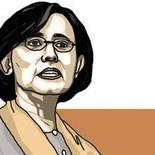
‘Women in general have more odds against them and have to work harder at everything in order to be recognised’
In many ways I have been a minority and an iconoclast almost all my working life — I was the first “woman” manager that Cadbury India hired in 1980, I was the first marketing executive from India to have worked in Cadbury U.K., Nigeria and South Africa (nobody had been sent abroad for those roles earlier), I was the first (female) Division President of The Coca-Cola Company to be based in Latin America, I was the first “female” professional MD/CEO of an FMCG Company in India, Britannia Industries Ltd. Additionally, I was and am single and Indian, especially in the global context of the 80s and 90s when Indians in the business world were largely based in India.
I must also confess, however, that my gender has not contributed in any way to my effectiveness in the various roles I have been in, whether executive or non-executive. What has really mattered in all leadership roles, in every company, every country and every continent I have lived and worked in, is my education, my skills, experience, perspective, curiosity, initiative, attitude, strength of character, etc. So when people talk about gender diversity in the workplace or boardrooms, my only response is that we have to shift the dialogue from gender to competence; from equality to equity; from ticking a diversity box to operating with conviction; from talking about glass ceilings to talking about open skies. Ceilings are restrictive — whether glass or any other material.
Leadership competencies are in many ways agnostic to gender and have more to do with character, empathy, conviction, and functional and adaptive skills. Because the lens through which we have chosen to view professional and personal success is gender, we continue to reinforce stereotypes and clichés. (Eg., women are frequently asked what is their mantra for work-life balance. Actually, mine is fairly simple as it looks at how my work fits into my life and not how my life fits into my work).
I also do not want to trivialise or simplify the issue. As a demographic, women in general have more odds against them and have to work harder at everything — from the home to agricultural fields to the work place, in order to be recognised and respected for their various contributions. Greater demands are placed on them at most times — schoolgoing girls are expected to share house work with their mothers, and for most women that does not change even when they are engaged in full-time jobs. Whilst the responsibility for creating an equitable society has to be shared by all, the epicentre of that change has to be the family and even within that, the dads. It is not enough to see Dangal and admire the tenacity of the family. Speaking for myself, I had the full encouragement and support of my parents, in my several adventures and that of my managers in various organisations — who believed in me and gave me bigger and bigger opportunities to pursue. That is what creates confidence and self-esteem and self-assurance, all of which are critical to well-being.
Annual attention
I am also puzzled by the annual attention paid ‘once a year’ to Women’s Day events and activities. Should not every day be women’s day — and men’s day and children’s day and environment day? Should we not think about respecting all people and the environment, every day? Should we not work towards creating ecosystems that are fair and equitable and view everything through a human lens and not a gender or ethnicity or religious lens? We are a diverse country, but we don’t really value diversity and inclusion. We need a few trailblazer organisations to come forward and take bold steps to pursue goals that foster equity and fairness, that pay attention to equality of opportunity, that reward behaviour which is inclusive, and that are truly interested in growth and development of all and the pursuit of what is right, irrespective of gender.